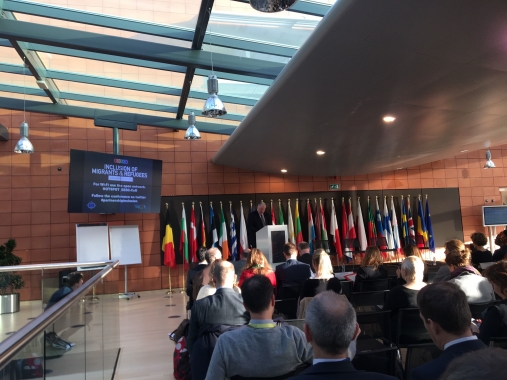Reconciling citizens with the reality of migration
Takeaways from the final conference of the EU Urban Agenda Partnership for Inclusion of Migrants & refugees
Brussels, 13 December 2018 | Published in Social
The final conference of the Urban Agenda Partnership for Inclusion of Migrants and refugees took place at the Committee of the Regions building in Brussels on December 4th. For the last three years, European cities, national governments, the European Commission and civil society organisations have been working together under the Urban Agenda for the EU Partnership on Inclusion of Migrants and Refugees to develop ideas and concrete actions to support the integration of refugees and other migrants in Europe.
Their Action Plan, published in November 2017, can be found here.
The conference presented the results of the work of the Partnership and offered the opportunity to discuss with EU institutions, national administrations, European cities and non-governmental organisations how to work better together towards inclusion of migrants and refugees. Specifically, representatives from the cities of Athens, Bristol, Berlin and DG HOME spoke on their experiences of making inclusive cities. Representatives from the European Commission, Committee of the Regions, EUROCITIES and the Council of European Municipalities and Regions spoke with attendees on the future of cooperation between the local and EU level.
Participants were able to contribute with their ideas to the future of the cooperation in the field of integration, during the breakout sessions under the following themes: “Improving migrant children integration in the EU”, “The Urban Academy on Integration: exchanging challenges and solutions”, “Innovative ways to finance integration in cities: micro-finance and blending loans and EU grants”, “Better data for more effective integration policies”, “Ask The People: Voice of Refugees and Migrants” and “The future of EU funding on integration”.
Two major takeaways from the conference were the following points:
- first, the need to reconcile citizens with the reality of migration, demonstrating that that there is no “crisis” as such and that national governments are able to “manage flows”.
- The second being the need to emphasis the point that, for both social and economic reasons, work on supporting and including migrant newcomers must happen at the beginning of their journey, not later on.
Another highlight was the launch of the report “Ask the People: a consultation with migrants and refugees by migrants and refugees in Europe” by the EMAB (European Migrant Advisory Board – one of the actions of the Partnership Action Plan). The section of the report dedicated towards housing revealed that:
• 20.3% of respondents said they don’t feel comfortable or dignified in their current place of residence;
• 23.2% said that they were living far from jobs or other services needed for daily life;
• Only 45.1% expressed having no fear of discrimination or racism in their current place of residence.
Recommendations for housing policy include:
• Housing should meet minimum standards required for dignified living;
• Housing should be close to services and have good transportation links;
• Housing allocation should contribute to the social integration of refugees and migrants, which includes mixed neighbourhoods, not migrant and refugee communities.
Through this Partnership is wrapping up, it hopes to continue its work. Indeed, The Urban Academy will hold its next meeting in May of next year. The two themes of this meeting, decided at the conference, will be “labour market integration” and “housing”. Keep an eye out on the website for updates.